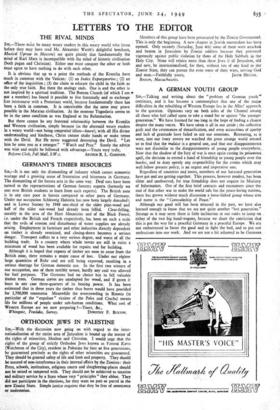GERMANY'S TIMBER RESOURCES sift,—It is not only the dismantling of
industry which causes economic wastage and a growing sense of frustration and bitterness in Germany. The dismantling of the forests acts in the same way. Deaf ears have been turned to the representations of German forestry experts (formerly we sent over British students to learn from such experts). The British zone is in any case poor in forests compared to other parts of Germany. Under our occupation Schleswig Holstein has now been largely denuded; and in Lower Saxony by 1948 one-third of the older pine-wood and
half of the older oak-wood had already been felled. Clear-felling, notably in the area of the Harz Mountains and of the Black Forest, i.e. under the British and French respectively, has been on such a scale that the evils of erosion and disturbance of water supplies are already arising. Employment in furniture and other industries directly dependent on timber is already restricted, and closing-down becomes a serious danger. Transport suffers to a very serious degree, and worst of all the building trade. In a country where whole towns are still in ruins a minimum of wood has been available for repairs and for building.
Although it is hoped that exports of timber are soon to cease from the British zone, there remains a major cause of loss. Under our regime large quantities of Ruhr coal are still being exported, resulting in a serious shortage for German domestic use. In the first two winters of our occupation, one of them terribly severe, hardly any coal was allowed for fuel purposes. The Germans had no choice but to fell valuable timber trees. German stoves are unadapted for wood, and if green it loses in any case three-quarters of its heating power. It has been estimated that in three years the timber thus burnt would have provided for 1,700,000 tenements Meanwhile the overcrowding in Bizonia (in particular of the "expulsee " victims of the Poles and Czechs) means life for millions of people under sub-human conditions. What sort of Western Europe are we now preparing ?—Yours, &c.,


































 Previous page
Previous page